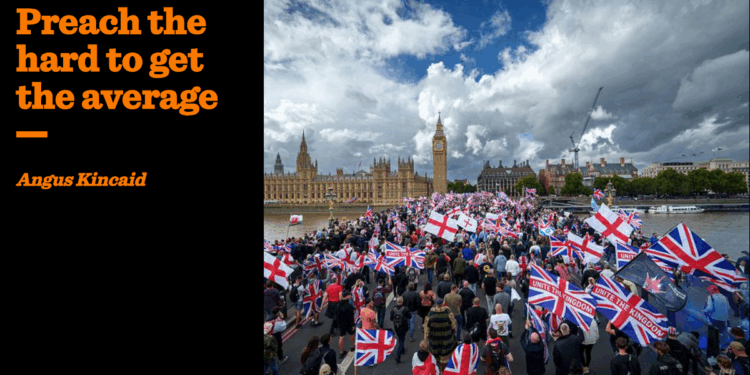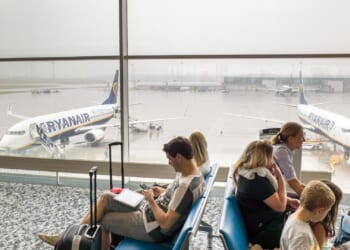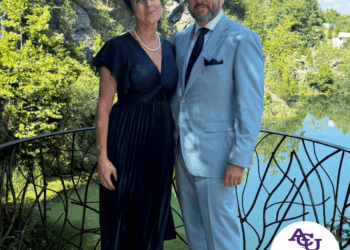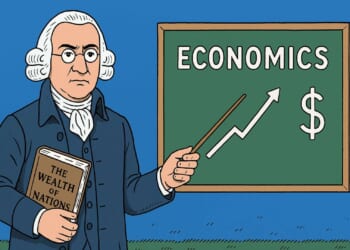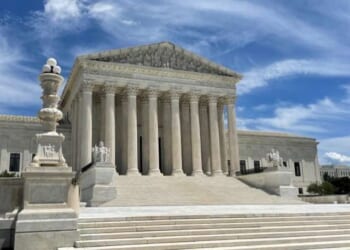The phrase “preach the hard to get the average” was a significant part of my childhood. Particularly, and peculiarly, I remember it often being said with regard to the mandatory two minutes for tooth brushing. Later in life however, a quick chat with mother revealed that Colgate (other brands are available) would be happy with a 60 second scrub. But it worked: all the pearly whites are still there.
The world of mainstream politics too is filled with this dynamic: people say one thing, on the periphery of the acceptable (just within the Overton window), in the pursuit of something more moderate.
However, this tactic isn’t confined to political provocateurs. The public too, can preach a “hard” in pursuit of moving the dial in their direction, while never expecting it to go the whole way. On Saturday 13 September, enormous numbers of people attended the “Unite The Kingdom” march in London. Images from press helicopters, social media, and public bodies showed huge crowds expressing discontent with the current status quo. Whether this was 100,000 or 3 million (I would be surprised if 1/20th of the nation had descended on Waterloo over the weekend) does not really matter. After all, these are only the people who made the trip; there are likely at least two or three more for every attendee that will share the sentiments that got people to don a Union Flag and march over from Southwark to Westminster.
With that said, as Sir Trevor Phillips stated in his quickly-deleted, very balanced view of the march attendees, most appeared to be much like those that one would expect to meet in the queue for the toilets during a football match.
It is my opinion that despite this march being organised by the very controversial Tommy Robinson, the banners for his new “party” Advance UK everywhere down Whitehall, and the deplorable remarks made by some of the speakers, the event should not be seen as a full-throated declaration of support for these characters or organisations.
On the 13th, I went with a friend to stand on Parliament Square and watch the gargantuan number of flags flutter past us to fill up Whitehall and the surrounding streets. I was offered a book from a nice seeming lady which I thanked her for but declined. I also turned down advice from Piers Corbyn. I walked down Whitehall to look at the stage setup prior to the beginning of the day’s events and saw the first of the arrivals walking towards me before I settled in Parliament Square to see the masses that followed. Of course, I saw a yobbo shouting at police who were standing peacefully at the side of the road, but of the thousands of others that I saw nobody else was looking to cause an issue. They just wanted to be seen and heard.
Flags were selected carefully, with a major preference for the Union Flag. Very few were “capital P” political, though I did see one UKIP and one Reform UK flag (not on the same pole). I do not remember whether I saw any endorsements of more fringe political parties, but I would have been surprised if the more “Political” banners made up more than two per cent of all present. There were plenty of Saltires, Welsh dragons, Cornish flags — one Cornish flag even had a Welsh Dragon on it.
This march was an outlet for pent-up frustration and a show of national pride that nobody had allowed to be released for a very long time. From what I saw and heard, anyone right of centre with a decent social media following and a few quips on immigration could have organised this event with a similar turn out. It just so happened that Tommy Robinson did it.
By joining in with this walk, the people are preaching the hard. But the vast majority of them just want the average. The key issues of over-migration, concern over safety surrounding asylum hotels, two-tier justice, etc. etc. are clearly being felt by many of those who joined the march. This does not mean that every person who picked up a Union Flag and sauntered over Westminster Bridge endorses Tommy Robinson or his “solutions”. Even less does it mean that they want to see Robinson in any position of power or elected office.
This was an outlet for people who felt frustrated, and who wanted their voices to be heard. Of course, there were scraps and arrests — there always will be at events this big on both sides of the political spectrum, and those who misbehave should feel the force of the law. But the Unite The Kingdom march was not a declaration of war on the country, or on the Government, nor was it a demonstration of three million people who want a radical nationalist takeover of the United Kingdom. It was a cry for help and plea for change from people who are feeling that they are simply not heard. And if you are not heard, you end up shouting louder.
After all, we live in a world where the squeaky wheel does indeed get the oil. They do not all feel the same sentiments or favour the same tactics as Tommy Robinson; he simply provided an outlet and an opportunity for people to make a point.
This should be a wakeup call for any in mainstream politics to listen and act. Most of the people they serve just want the average.

